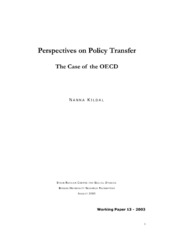| dc.contributor.author | Kildal, Nanna | eng |
| dc.date.accessioned | 2006-06-21T15:20:48Z | |
| dc.date.accessioned | 2020-12-10T06:31:53Z | |
| dc.date.available | 2006-06-21T15:20:48Z | |
| dc.date.available | 2020-12-10T06:31:53Z | |
| dc.date.issued | 2003-08 | eng |
| dc.identifier.issn | 1503-0946 | |
| dc.identifier.uri | https://hdl.handle.net/1956/1394 | |
| dc.description.abstract | The issue of this working paper is the study of ‘policy transfer’ between international organisations and national welfare reforms, which is illustrated by a study of the OECD. As the OECD’s multilateral surveillance is limited to the exertion of moral pressure and the practice of ‘naming and shaming’, this organisation constitutes an interesting case for study as the power of the ideas advocated by international organisations is more exposed in the absence of financial or legal pressures. Thus, the question is whether the OECD has the ‘ideational authority’ to influence its member countries. The paper present different roles played by the OECD in what is called the ‘idea game’, and the question whether the OECD is an influential international actor is discussed on the basis of a recent study of the impact of the OECD’s political analyses and recommendations on national social policy, in 14 European countries over a 30-year period. As a conclusion, it is argued that the OECD’s plans for policy changes are not easily introduced into national political agendas. Rather, policy proposals seem to have a chance of being adopted only if they resonate well with national politics, institutions and broadly held values. | en_US |
| dc.description.abstract | Notatet diskuterer ulike sider ved studiet av ‘policy transfer’, illustrert ved en analyse av OECD. Etter som OECDs overvåkning og kontroll av medlemslandenes utvikling er begrenset til utøvelsen av moralsk press, er denne organisasjonen spesielt interessant ved studiet av internasjonale organisasjoners innflytelse på enkeltland: de politiske idéenes gjennomslagskraft blir særlig godt belyst ved fravær av økonomisk og rettslig press. Spørsmålet er om OECD har den ideologiske autoritet som kreves for å innvirkning på medlemsstatenes sosialpolitiske utvikling? Notatet presenterer og diskuterer forskjellige roller som OECD inntar i sitt ’idé spill’, og spørsmålet om hvorvidt OECD er en innflytelsesrik internasjonal aktør blir drøftet på basis av en nylig gjennomført studie av den innflytelse OECD utøver gjennom sine sosialpolitiske analyser og anbefalinger til 14 europeiske velferdsstater gjennom en 30-årsperiode. En hovedkonklusjon er at OECDs ideer for politiske reformer ikke lett kan introduseres til nasjonale politiske agendaer. Politiske forslag synes bare å ha en sjanse til å bli akseptert dersom de får en klangbunn i den nasjonale politikken og i bredt aksepterte nasjonale verdisystemer. | no |
| dc.format.extent | 416457 bytes | eng |
| dc.format.mimetype | application/pdf | eng |
| dc.language.iso | eng | eng |
| dc.publisher | Stein Rokkan Centre for Social Studies | eng |
| dc.relation.ispartofseries | 13-2003 | |
| dc.relation.ispartofseries | Working Paper | en |
| dc.title | Perspectives on Policy Transfer. The Case of the OECD | eng |
| dc.type | Working paper | eng |
| dc.subject.nsi | VDP::Samfunnsvitenskap: 200 | nob |
